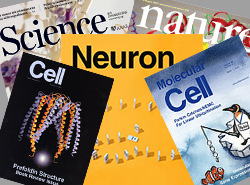Publication of IMPRS-LS student Alexandra Klein

Klein, A.S., and Gogolla, N.
Science, 2021, 371, 122-123.
doi: 10.1126/science.abf5940
How mice feel each other's pain or fear
Empathic behaviors play crucial roles in human society by regulating social interactions, promoting cooperation toward a common goal, and providing the basis for moral decision-making (1, 2). Understanding the neural basis of empathy is crucial to understanding not only the human mind but also the neural mechanisms that give rise to social behaviors and the principles of our societies. Functional imaging studies in humans have identified essential brain regions that are engaged when people empathize with the affective experiences of others. However, human neuroimaging studies provide only limited spatial resolution and are solely correlative in nature. It has thus remained unclear how empathy with distinct affective experiences is set apart within the brain. read more
